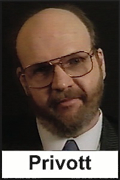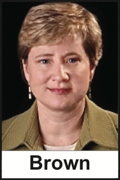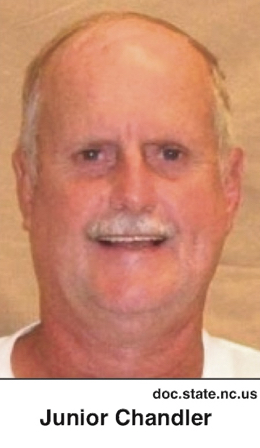Rascals case in brief
In the beginning, in 1989, more than 90 children at the Little Rascals Day Care Center in Edenton, North Carolina, accused a total of 20 adults with 429 instances of sexual abuse over a three-year period. It may have all begun with one parent’s complaint about punishment given her child.
Among the alleged perpetrators: the sheriff and mayor. But prosecutors would charge only Robin Byrum, Darlene Harris, Elizabeth “Betsy” Kelly, Robert “Bob” Kelly, Willard Scott Privott, Shelley Stone and Dawn Wilson – the Edenton 7.
Along with sodomy and beatings, allegations included a baby killed with a handgun, a child being hung upside down from a tree and being set on fire and countless other fantastic incidents involving spaceships, hot air balloons, pirate ships and trained sharks.
By the time prosecutors dropped the last charges in 1997, Little Rascals had become North Carolina’s longest and most costly criminal trial. Prosecutors kept defendants jailed in hopes at least one would turn against their supposed co-conspirators. Remarkably, none did. Another shameful record: Five defendants had to wait longer to face their accusers in court than anyone else in North Carolina history.
Between 1991 and 1997, Ofra Bikel produced three extraordinary episodes on the Little Rascals case for the PBS series “Frontline.” Although “Innocence Lost” did not deter prosecutors, it exposed their tactics and fostered nationwide skepticism and dismay.
With each passing year, the absurdity of the Little Rascals charges has become more obvious. But no admission of error has ever come from prosecutors, police, interviewers or parents. This site is devoted to the issues raised by this case.
On Facebook
Click for earlier Facebook posts archived on this site
Click to go to
Today’s random selection from the Little Rascals Day Care archives….
Click for earlier Facebook posts archived on this site
Click to go to
Today’s random selection from the Little Rascals Day Care archives….
Among the costs of incarceration: a marriage
Jan. 9, 2012
Perhaps the most inexplicable of the prosecution’s targets was 40-year-old Scott Privott, owner of an Edenton video store and shoe repair shop.
Son of a district court judge, he served as president of the local country club. No evidence ever surfaced to support the rumor that Privott’s video store was a hub for child pornography or to counter his claim never to have even set foot on the Little Rascals premises. According to the prosecution, children at the day care identified him as a perpetrator.
 In April 1993 his bail was reduced from $1 million to $50,000, and he was released on bond from Chowan County Jail. Fourteen months later, Privott accepted the state’s offer of a plea of no contest, still insisting on his innocence, and received a sentence of time served with an additional five years probation.
In April 1993 his bail was reduced from $1 million to $50,000, and he was released on bond from Chowan County Jail. Fourteen months later, Privott accepted the state’s offer of a plea of no contest, still insisting on his innocence, and received a sentence of time served with an additional five years probation.
He says he has been happily married for 14 years and doesn’t want to reveal where he now lives. I asked him to share some recollections about the case:
“Bob and I were more acquaintances than close friends. I played golf with him when he was the pro. Bob rented movies from my store, and he and many others would come by and have coffee and just talk. In fact, many of the accusing parents rented movies from me. (Bob Kelly suspects Privott may have been drawn into the case when Kelly’s truck was seen parked in front of the video store.)….
“In jail I spent the time reading and watching TV. We weren’t allowed newspapers, so I wasn’t sure what was being written about the case…. At times it was hard to keep my spirits up. I had gallbladder surgery and recuped at Central Prison in Raleigh and at McCain (Correctional Hospital in Raeford, closed in 2010)….
“Jail had just a walled-in area for outside activity, but at McCain I enjoyed being able to walk around the yard with others awaiting trial…I was in “safekeeping” and actually met some intelligent, thoughtful people. I never had any problems, as the majority knew the entire LRDC case was a farce….
“My wife came on Sundays, but as the years rolled on the visits were less and less, and then I noted a change I had been kind of expecting. She brought my mother with her, and in the later years she stood back and kind of let the visits be between mother and son. It turned out she had met someone new in her life. She didn’t have the nerve to tell me, but I figured it out….”
It’s a long way from Duke to Avery-Mitchell Correctional
 March 21, 2015
March 21, 2015
I spent several hours Friday at Duke University Law School listening to experts detail “Evolving Trends in Forensic Science.”
Fascinating. Topics ranged from the effects of sleep deprivation on jurors’ decision-making to the use of cell tower evidence to determine suspect location. But I was wedged into an auditorium otherwise full of lawyers to hear pediatrician Cynthia Brown and defense attorneys Mark Montgomery and Lisa Miles outline the latest standards for medical exams in cases of suspected child abuse. The good news – if you’re being wrongfully prosecuted in 2015 – is that those standards have become dramatically more specific and sophisticated.
If, however, you were wrongfully prosecuted in 1987, then the fruits of that scientific progress remain maddeningly out of reach. Waiting for me when I returned home Friday was a letter from Junior Chandler:
“April 15 will be 28 yrs – nearly half my life, all because of lies when I did no crime. It’s a shame & disgrace to the whole N.C. justice system, not only to do this but never to be willing to say they were wrong….”
27 million chances to provoke mass hysteria
Sept. 26, 2012
“The (Little Rascals) kids stories have unerringly followed the ritual abuse plot, progressing lately to tales of witnessing babies slaughtered. Perhaps not coincidentally, their most bizarre allegations began surfacing around the time that 27 million viewers watched ‘Do You Know the Muffin Man?’ a (Lifetime TV) movie that rehashed details from several ritual abuse cases, but included the wholly fictional climax of parents discovering day-care teachers worshipping the devil amidst piles of kiddie porn.”
– From “The Ritual Sex Abuse Hoax” by Debbie Nathan (Village Voice, January 12, 1990)
“Muffin Man” aired October 22, 1989 – simultaneous with not only the ongoing arrests of Little Rascals defendants but also the satanic-baby-kidnap rumor sweeping East North Carolina.
“These stories keep cropping up all over the country,” observes the “Muffin Man” prosecutor. “With this many Satan ritual abuse cases, there has got to be something out there.” (In the Little Rascals case, this “Where there’s smoke…” rationale was most notoriously put forth by UNC Chapel Hill psychologist Mark Everson.)
In Bucks County, Pa., however, District Attorney Alan Rubenstein couldn’t help noticing that complaints about ritual abuse at Breezy Point Day School went from a trickle to a torrent the day after “Muffin Man” aired. Unlike so many other prosecutors in Edenton and elsewhere, Rubenstein saw through the claims and crushingly debunked them.
Chandler’s sentence designed to lock him up forever
 Nov. 8, 2015
Nov. 8, 2015
“The latest obstacle to Gerald Amirault’s freedom came without fanfare. A three-member panel of the Massachusetts Department of Corrections has now decided that, since the prisoner has refused participation in treatment programs for sex offenders, he was considered to be ‘in denial.’ Permission for him to appear before the Board that could grant early parole would therefore be denied.”
– From “How to Extort a Confession” in the Wall Street Journal (April 22, 2002)
Steadfast in his supposed “denial,” Amirault wouldn’t be paroled until 2004 – 18 years into his 40-year sentence.
Compared with Junior Chandler, however, he was lucky. Chandler’s two consecutive life sentences have made him ineligible for parole. For a brief moment during his long and maddening appeals process, in 2008, it seemed those life sentences would be made concurrent – thus qualifying him for parole consideration. But a switch in judges, orchestrated by the attorney general’s office, vaporized that prospect.
A footnote: The North Carolina Department of Correction has its own Sexual Offender Accountability and Responsibility program. “Through psycho-educational modules, behavior techniques and empathy training,” its website says, “S.O.A.R. participants learn that sexually abusive behavior is both controllable and manageable.”
Junior Chandler recalls having been invited to participate, but …. “They said I had to admit I was guilty. I told them I couldn’t do that, because I hadn’t done anything…. What would you do?”











0 CommentsComment on Facebook